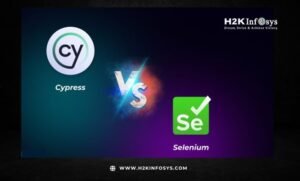Selenium has established itself as one of the most powerful and widely used automation testing tools in the software industry today, with testers across the globe relying on it for streamlining their testing processes. Its immense popularity can be attributed to the fact that Selenium offers unparalleled reliability, versatility, and ease of use, which makes it a go to choice for both beginners and experienced professionals alike.
The tool’s flexibility is another key factor, as it supports cross-browser testing and is compatible with multiple platforms. Additionally, Selenium allows for seamless integration with various automation frameworks and tools.
One of the standout features of Selenium is its ability to support a wide range of programming languages. This feature empowers testers to use the language they are most comfortable with, thereby reducing the learning curve and increasing productivity.
Whether it’s Java, Python, C#, Ruby, JavaScript, or PHP, Selenium Automation Testing accommodates them all, providing testers with the freedom to choose a language that best suits their project requirements and team expertise. This flexibility allows teams to leverage their existing knowledge while ensuring effective test automation for any project.
Automation testing, however, does require a solid understanding of at least one programming language, since the scripts used for testing are written in code. While it’s tempting to try and learn as many languages as possible, it’s more practical to focus on one or two languages that align with the project and the team’s needs. For Selenium-based projects, the following programming languages are among the most popular and effective:
Java
Java has been one of the most widely used programming languages in Selenium automation testing. Since Selenium WebDriver was initially developed using Java, it enjoys superior compatibility with Java-based environments. Java also provides extensive community support, libraries, and documentation, which makes it easier for testers to resolve issues and build efficient test scripts. Many large organizations use Java, so choosing Java for Selenium can align well with enterprise-level projects. Additionally, Java integrates smoothly with testing frameworks like TestNG and JUnit.
Python
Python is another top choice for Selenium testing due to its simplicity and readability. It has a shorter learning curve, which makes it ideal for beginners or testers who want to write clean and easy-to-understand test scripts. Python scripts are more concise than Java, making the process of writing automation scripts faster and more efficient. Selenium WebDriver supports Python, and the language’s extensive set of libraries and frameworks, such as PyTest, make it a robust option for automation. Its increasing popularity in data science and web development also makes Python a versatile language to learn for testers working across different domains.
C#
For teams that work in the Microsoft ecosystem, C# is often the language of choice. Selenium WebDriver has excellent support for C#, and its integration with Microsoft’s Visual Studio and the .NET ecosystem makes it a perfect match for testers working with ASP.NET applications or in organizations that rely heavily on Microsoft technologies. C#’s syntax is somewhat similar to Java, making it easier for those with Java experience to switch over. The availability of testing frameworks like NUnit and MSTest enhances C#’s suitability for Selenium automation.
JavaScript
JavaScript is gaining momentum in the automation testing world, thanks to the rise of front-end frameworks like Angular, React, and Vue.js, where JavaScript is extensively used. With the introduction of Selenium WebDriver for Node.js (WebDriverIO), testers can now write Selenium tests in JavaScript. For testers involved in testing web applications that are built using JavaScript, this can be a natural and effective choice. JavaScript testing frameworks like Mocha and Jest can be seamlessly integrated into the testing workflow, making JavaScript an ideal option for full-stack developers and testers working closely with front-end teams.
Ruby
Although not as popular as Java or Python, Ruby is a preferred language for some testers due to its simplicity and ease of use. Ruby’s concise and expressive syntax can speed up the process of writing test scripts. It also enjoys strong community support and offers frameworks like RSpec and Cucumber, which make behavior-driven development (BDD) possible in Selenium testing. Ruby can be a good option for teams who prioritize readable and maintainable test code.
What is the Selenium tool?
Selenium is an open source automation testing tool primarily used to automate web and mobile browsers. Its versatile framework allows testers to perform automated tests on a variety of platforms, including Windows, Linux, and macOS. Selenium supports a wide range of web browsers, including Chrome, Firefox, Safari, Opera, and Internet Explorer, enabling cross-browser testing and ensuring that web applications function as expected across different browsers.
In addition to its cross-platform and cross-browser support, Selenium offers compatibility with several programming languages, such as Java, Python, Ruby, C#, PHP, and .NET. However, when it comes to automation testing with Selenium, many testers gravitate toward Python and Java due to their ease of use, extensive libraries, and powerful community support.
Why Python and Java are Preferred by Automation Testers
In the following section, we will explore the reasons why Python and Java are the most commonly used programming languages by automation testers using Selenium. These languages offer numerous advantages that make them stand out as the best choices for writing Selenium Tester scripts, contributing to their popularity in the automation testing community.
Factors to consider before selecting a language for selenium
When choosing a programming language for Selenium automation testing, it’s important to carefully evaluate several factors to ensure that the selected language aligns with both the project’s requirements and the team’s expertise. Below are the key factors to consider before selecting a language for Selenium:
Team’s Expertise and Skillset
- Current Team Knowledge: The existing skills of your team members should be a major consideration. If your team is already proficient in a specific language, such as Java or Python, it makes sense to choose that language for Selenium automation. This minimizes the learning curve and allows the team to be productive right from the start.
- Ease of Learning: If your team is not familiar with any of the Selenium-supported languages, consider how easy or difficult it will be for them to learn a new language. For instance, Python is known for its simple and readable syntax, making it easier for beginners compared to languages like Java or C#.
Project Requirements
- Type of Application Being Tested: The nature of the application under test can influence the choice of programming language. For example, if the project is being developed in a specific language (like Java for a backend-heavy application), it may be beneficial to align the test scripts with that language for better integration and maintenance.
- Performance Considerations: If performance is a critical factor in your test automation strategy, you may need to select a language that compiles faster or is more efficient for executing large-scale test cases. While Python is user-friendly, Java may offer better performance in some situations due to its compiled nature.
Integration with Existing Tools and Frameworks
- Continuous Integration/Delivery (CI/CD) Pipelines: If your project uses tools like Jenkins or Bamboo for continuous integration, you should check whether the language you choose integrates well with those tools. Java and C# often have better support for enterprise-grade CI/CD tools, while Python can be integrated with many open source alternatives.
- Testing Frameworks: Some programming languages have better support for specific testing frameworks that complement Selenium. For instance, Java has extensive support for TestNG and JUnit, while Python works well with PyTest. The availability of testing libraries and frameworks can play a key role in the decision-making process.
Community Support and Documentation
- Language Popularity: The popularity of a programming language can affect the availability of resources, libraries, and support from the broader testing community. Languages like Java and Python have large communities, ensuring access to a wealth of tutorials, forums, and libraries to help troubleshoot issues or speed up development.
- Documentation and Tutorials: Selenium has comprehensive documentation for all supported languages, but some languages like Java and Python have more extensive resources due to their popularity. Strong community support can also ensure you have access to solutions for common issues, third party libraries, and examples to help guide your work.
Maintainability and Scalability
- Code Readability: The readability of code is crucial, especially when working in a team or on long term projects. Python’s simple and readable syntax makes it a great choice for projects where maintainability is a priority. On the other hand, languages like Java may require more verbose code but offer strict typing, which can reduce errors in large projects.
- Ease of Debugging: It’s important to consider how easy it is to debug and maintain test scripts in a given language. Some languages, such as Python, may be easier to debug due to the clarity of error messages, while others like Java or C# might provide better tooling for debugging large test suites.
Cross-Platform and Cross-Browser Compatibility
- Operating System Support: While Selenium itself is cross platform, the programming language you choose must also support the operating systems on which your tests will run. For example, if your tests need to be run on a mix of Windows, macOS, and Linux, you need to ensure that the language you choose supports these platforms.
- Browser Support: While Selenium supports all major browsers, the language you choose should also seamlessly support cross-browser testing. Some languages may have better Libraries or more mature tooling for certain browsers, so it’s important to check this before deciding.
Speed of Test Development
- Test Script Writing Speed: If rapid test script development is a priority, choosing a language with less verbose syntax (like Python or Ruby) can help speed up the writing process. For example, Python’s concise syntax allows testers to write fewer lines of code to achieve the same functionality that may require more lines in Java or C#.
- Development and Maintenance Speed: Consider the long-term implications of maintaining test scripts. Languages that are easy to write but difficult to maintain can slow down the project over time, while languages that enforce strict coding standards may offer long-term benefits in code quality and maintainability.
Support for Parallel Testing and Test Frameworks
- Concurrency and Parallel Execution: If your project requires running tests in parallel (for example, to speed up execution time in a CI pipeline), ensure that the programming language you choose has robust support for parallel test execution. Java, for instance, has strong concurrency support with frameworks like TestNG and can handle parallel testing effectively.
- Integration with Automation Frameworks: Some programming languages have better integration with automation frameworks like Appium for mobile testing, JUnit, or TestNG for Selenium WebDriver. If your project requires the use of multiple frameworks, the choice of language should be compatible with all of them.
Licensing and Cost
- Open-Source vs. Proprietary Tools: Consider whether the programming language you choose has any licensing costs. Selenium is open-source, and so are languages like Python, Java, and Ruby. However, if your project requires integration with paid tools or frameworks that support specific languages, you should factor in the additional cost.
Test Reporting and Analytics
Test Data Management: Depending on the complexity of your project, you may also need robust data management capabilities. Some programming languages have better built-in support or libraries for managing test data, such as reading from Excel files or integrating with databases, which can enhance the overall testing process.
Reporting Libraries: The ability to generate comprehensive and easy-to-read test reports is crucial for stakeholders. Ensure that the language you select has good support for test reporting libraries. For instance, Java supports popular reporting tools like ExtentReports and Allure, while Python offers similar functionality through third-party libraries.
Conclusion
Selenium opens a pathway to explore different languages and channels for automation testing. In the article, we have discussed the factors to consider and mentioned the best languages for you to learn. While you may decide to continue with these languages, the list is numerous and you can increase your chances to improve your knowledge by learning more than one. Begin you enrolling in an online Selenium training today.
Call to Action
If you’re looking to excel in Selenium automation testing, Java and Python are the top choices due to their extensive community support, ease of use, and compatibility with Selenium. Both languages offer the versatility and power needed to create efficient test scripts for web applications.
Ready to master Selenium with the best programming language for your career? Enroll in H2K Infosys‘ comprehensive Selenium training courses and gain hands-on experience in both Java and Python. Kickstart your journey to becoming a skilled automation tester today!





























